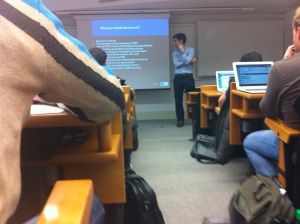I wanted to go ahead and post my final thoughts on IE Tech Startups and talk about our new business here as well (taken from the paper I wrote on the topic):

Introduction and Thoughts
As an aspiring entrepreneur, IE Tech Startups was one of the most useful classes that I have had during my time in the MBA. I am a co-founder of a Spain based startup called Deal Boss, SL (www.dealbossapp.com is the English language web site – the Spanish version is coming soon) and I found a lot of the material applicable. For example, when we were talking about Todotaladros.com with Alberto Torrón I kept thinking about the possibility of funding our startup from a normal corporate type position and then transitioning to full time as the business grew. It was also interesting to see how some of the lessons around staffing and outsourcing portions of your business as a launch strategy aligned with our near term concerns.
Product
Our smartphone application (currently in the submission process with Apple) is currently focused on using the iPhone to make it easier to find and use the discounts offered from the “daily deal” sites (such as Groupon) coming into existence around Europe. In terms of features, the application aggregates Groupon, Groupalia, and Offerum into a single stream of deals. Users can easily browse Spain based deals by map, list and cover flow, with sorting by date, price and category. Deals are displayed automatically for the user’s city (detected using location services in the mobile), but the app also allows viewing other supported cities. The app also allows users to buy, save, set a calendar/reminder, and share deals on Facebook, Twitter, and through email.
In the short term we would like to continue to improve the user interface, include more deal vendors, and focus on getting the app into the hands of as many users as possible so we can get feedback to improve.
In the long term we hope to find ways to improve the application to provide greater deal management functionality, such as email alerts to users, customized searches for specific deal types, following specific businesses and any deals from them, and easier to use calendaring of deals. We also want to move quickly to work with the deal vendors on their plans to offer instant deals and hopefully provide an avenue for consumers to pull out their mobile, see any instant deals near them, then walk in and redeem those offers. In addition, we plan on adding the Android platform to the existing iPhone support.
Business
In terms of the business, the initial revenue stream comes from the commissions provided by the deal vendors to DealBoss when a sale is made. In March 2011 we signed an agreement with Groupon for 10% of sales, although we expect other vendors will offer less. As soon as the application is approved by Apple, the DealBoss team is going to continue negotiations with other deal vendors in order to obtain funding streams. In addition to more deal vendors, DealBoss is planning (starting in 2012) to provide subscription based marketing analytics to businesses looking for additional information about their customers.
Currently DealBoss is trying to raise approximately €250,000 in order to fund development for the rest of 2011. As a result, I especially found the classes with investors to be particularly useful – in terms of how investors viewed potential companies (Rodolfo Carpintier) and how different VC deals can be structured (Roberto Saint-Malo).
Although the explosive growth rate of deal sites should offer an excellent market opportunity in the near term for a high level of profitability (I’m not including the chart on this blog post), there is a long term risk that the market will consolidate into a very small number of deal vendors, making the product less useful. We can mitigate this by providing other deal sources outside of simply daily deals, but it may also provide an exit opportunity for an interested buyer who wants to compete in mobile.
Near Term Future
In the next few weeks DealBoss will be launching a Spanish language web site including a product video (the current product video is in English), finishing the approval process with Apple in the iTunes store, adding content providers, and making small improvements to the application in response to customer feedback and additional beta testing. We will also begin the transition from a team of six to a team of two plus four part time advisors and attempt to maintain a functioning business with a minimal staff.
Final Thoughts on Course
I absolutely loved the way we got to meet with real entrepreneurs and investors and learn about their challenges and viewpoints. I think the only challenge is deciding when a course like this would be best to take, by term five we were all either immersed in our own startups or looking for employment. However, any earlier and it wouldn’t have been as “real” and useful for us as we are working on our businesses. Either way, this was one of the best and most useful courses I took during my time in the MBA and I thoroughly enjoyed it.


 April 6, 2011: Today’s talk is from Ronald J. Friedlander, founder and CEO of ReviewPRO, a startup dealing with social media monitoring and reputation management for hotels. (see image at left to see how it works).
April 6, 2011: Today’s talk is from Ronald J. Friedlander, founder and CEO of ReviewPRO, a startup dealing with social media monitoring and reputation management for hotels. (see image at left to see how it works).
